June 17, 2025 | 13:47 GMT +7
June 17, 2025 | 13:47 GMT +7
Hotline: 0913.378.918
June 17, 2025 | 13:47 GMT +7
Hotline: 0913.378.918
Gia An mangosteen farm, located in Bon S’re U (Village 8), Dak Nia Commune, Gia Nghia City, Dak Nong Province, is an exemplary organic farming model. The farm belongs to 64-year-old Tran Quang Dong, who is often regarded as a pioneer in organic farming since the early days of his venture.
Tran Quang Dong’s family farm spans 20 hectares, with over 8 hectares dedicated to mangosteen, also known as the "king of fruits." Dong plants a variety of crops such as avocados, durian, and long-lived timber trees such as black star, Burma padauk (Pterocarpus macrocarpus), and cam xe (Xylia xylocarpa) on the remaining area. These forested areas surround the farm, acting as a natural shield for the farm’s organic fruit trees.
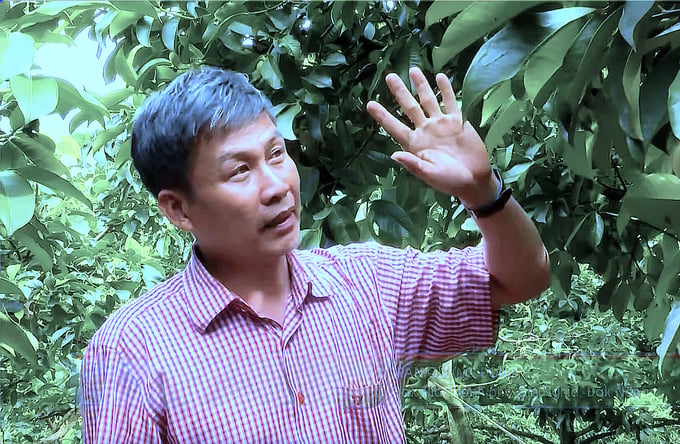
Tran Quang Dong, standing in the Gia An mangosteen farm. Photo: Hong Thuy.
"My wife and I moved to Dak Nong from Hoc Mon (Ho Chi Minh City) nearly 30 years ago in order to start a new life. At the time, the land here was vast, unoccupied, and relatively affordable. As long as you put in the time and effort, you can acquire land and establish a farm. After spending some time in the region, I noticed that the weather and climate conditions were ideal, the soil was fertile, and the environment was clean, due to a lack of agricultural activities. After conducting surveys, I found that the area was suitable for the cultivation of various crops, especially fruit trees. With a passion for mangosteen since childhood, and after learning that several local farmers had already purchased mangosteen trees from Ben Tre for local cultivation, I decided to invest further.
Mangosteen is a large tree in the garcinia family, grown in several Southeast Asian countries. In Vietnam, it is mostly cultivated in the south. After understanding the growth characteristics, climate, and soil conditions for mangosteen cultivation in Lai Thieu (Binh Duong Province), I realized that Dak Nong Province is suitable for the cultivation of this tree. As a result, I started purchasing mangosteen seedlings in 2000 and planted them on a one-hectare plot. After witnessing the trees' healthy growth, I expanded the cultivation area," Dong explained.
According to Dong, mangosteen trees, similar to other forest trees, boast a slow growth cycle. Consequently, the trees require protection in the first three years in order to retain moisture. As the trees mature, their roots extend deeper into the soil, allowing them to draw water on their own. Additionally, mangosteen trees have bitter sap that helps resist a number of insects and pests, simplifying pest control efforts compared to durian or some other fruit trees.
"I avoid using chemical pesticides to control pests on the mangosteen trees. As an alternative, I spray essential oils to repel insects and protect young leaves and fruit. To prevent fruit flies from infesting the mangosteen, I use biological traps—plastic bottles with holes coated with a biological solution, which I hang on tree trunks to lure and trap the flies," Dong explained.
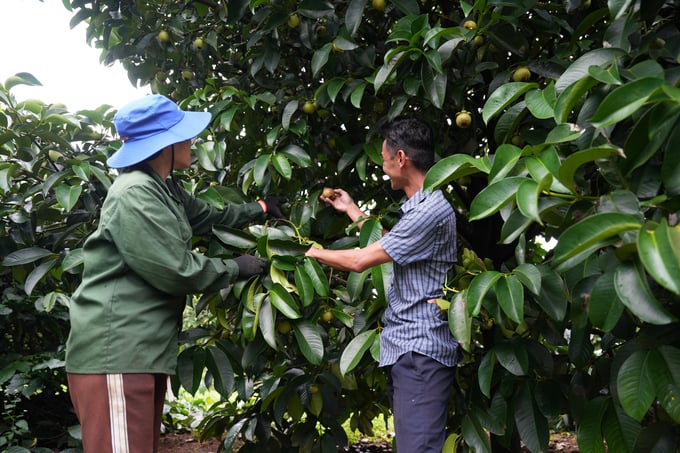
Dong’s mangosteen farm produces safe fruits for consumers owing to its entirely natural cultivation process. Photo: Hong Thuy.
According to Dong, Dak Nong Province hosts suitable conditions for the production of long-term crops such as coffee, durian, and mangosteen. Due to the area’s unique weather, climate, and altitude features, mangosteen and durian trees in Dak Nong typically bear fruit several months later than compared to other provinces.
"Trees in this area begin to flower around April. We only begin our harvest after other regions have finished theirs. This is a significant advantage for local farmers, especially when their products received official certifications for origin and brand," Dong assessed.
Before initiating his mangosteen cultivation venture, Dong was committed to producing high-quality products, despite the unfamiliarity of organic farming as a concept at the time, as well as the general lack of knowledge regarding the organic process.
"I noticed that local farmers previously had the habit of fertilizing vegetables with untreated and foul-smelling manure, causing severe environmental pollution. In addition, they sprayed pesticides and growth stimulants without regulation. They sold their harvest and ate vegetables they grew separately. As a result, the farmers, their families, neighbors, and consumers were unknowingly exposed to harmful chemical fertilizers and pesticides. When I started my farming venture, I made a promise to myself to avoid causing harm. More importantly, I wanted to ensure that my family could eat healthy, safe food,” Dong shared.
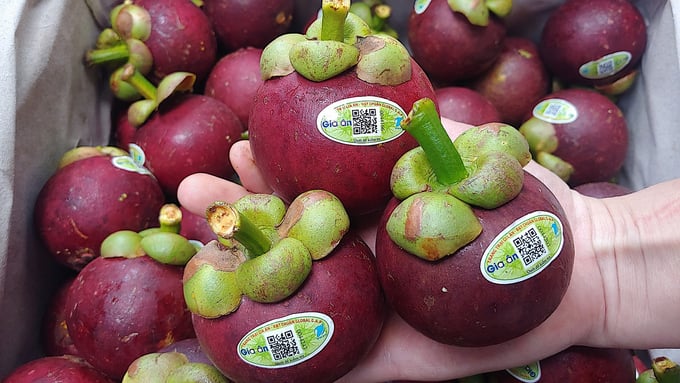
In addition to exports to the Netherlands, Gia An only has sufficient mangosteen to supply major domestic markets such as Da Lat, Hanoi, and Ho Chi Minh City. All products are labeled with traceability tags. Photo: Hong Thuy.
Dong initially followed his own clean farming process, which involved minimizing the use of chemical fertilizers, properly composting manure, and avoiding harmful chemicals and pesticides. Additionally, he only removes select weeds around the tree trunks, thereby creating a conducive environment for insects and maintaining soil moisture.
After receiving guidance from local authorities on safe farming practices, Dong noted that the recommended methods were similar to his currently employed practices. In 2013, he began adopting the GlobalGAP farming standards, and since 2016, his mangosteen farm has consistently met global clean farming criteria. At present, Gia An's mangosteen is one of the few agricultural products in Dak Nong Province to receive a 4-star OCOP certification.
Dong explained that a successful GlobalGAP-compliant farming model requires technical knowledge as well as constant surveillance of each step in the process, from soil preparation to tending, harvesting, transportation, and storage.
"Each stage of the tree’s growth—from flowering to fruit setting and harvesting—has specific timing, and each stage requires a different fertilization and watering formula. During the harvesting stage, the products must meet specific criteria for export, all of which are detailed in regulations and fully recorded in a logbook. This logbook allows for accurate assessment of product quality, and we can trace back to identify where the error occurred should an issue arise," Dong said.
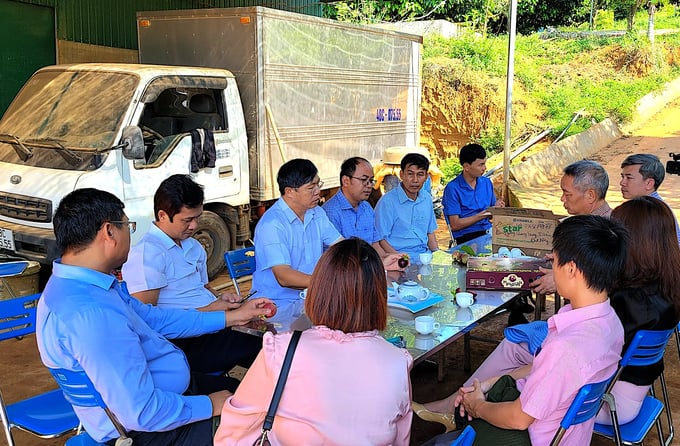
Gia An farm is a popular destination for various customer groups, including tourists, students, farmers, and agricultural officials, who visit to gain insights into the organic farming process. Photo: Hong Thuy.
At present, a company has signed a long-term partial offtake contract for Gia An mangosteen. Accordingly, the company exports Gia An produce to the Netherlands at prices 3 to 4 times higher compared to the domestic market. The remainder of the farm's yield is sold in various major domestic markets, including Ho Chi Minh City, Hanoi, Da Lat, and Da Nang. All products are labeled with traceability tags, featuring prices higher than the market average.
"To achieve sustainable development and enhance product value, gaining acceptance in high-end markets both domestically and internationally, there is only one approach: creating high-quality products inside and out. This means they must have an appealing appearance, excellent taste, and be safe for consumption. With this goal in mind, organic farming practices are essential," emphasized Tran Quang Dong.
Translated by Nguyen Hai Long
/2025/06/17/2013-1-nongnghiep-112009.jpg)
(VAN) This notable growth trend reflects the global taste for fresh, nutritious fruits and the expanding use of lychees across various sectors.

(VAN) The political and cultural insulation of Japan’s beloved grain is falling apart, and experts warn the country’s relationship with the staple will have to adapt.

(VAN) Noting risks, report examines impacts of avian influenza, changing trade patterns since 2022, fish fraud, and shipping industry’s net-zero goals.

(VAN) Mr. Tran Quang Bao, General Director of the Forestry and Forest Protection Department, met and worked with the International Wood Products Association to promote cooperation in the field of timber trade.

(VAN) China's outbound shipments of rare earths in May jumped 23% on the month to their highest in a year, though Beijing's export curbs on some of the critical minerals halted some overseas sales.

(VAN) To sustain capital flow, administrative reform alone is not enough; what farmers truly need is an ecosystem where both government and businesses grow together in support.
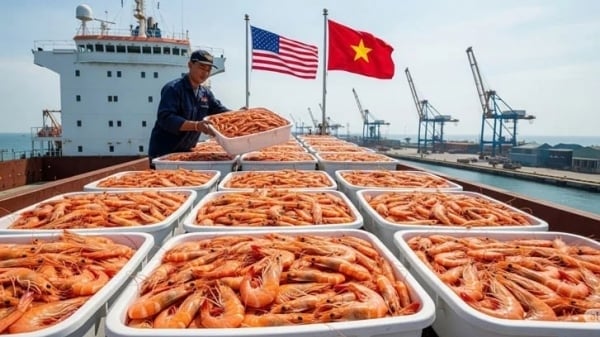
(VAN) Vietnam and the United States are proactively working together, each in their own way, to ensure that every container of agricultural goods carries not just products, but also long-term trust and value.